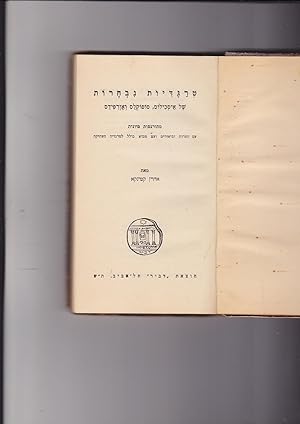Beschreibung
In (vowelized) Hebrew. 255 pages. 185 x 110 mm Aharon (Armand) Kaminka (1866 Berdichev, Kiev Province ? 1950 Eretz Israel) was a Hebrew poet, playwright, translator, and scholar. In 1880, he was sent to Berlin to study at the rabbinical college founded by Esriel Hildesheimer. At the age of 17, in Hamburg, he founded a society called Ahavat Tsiyon (Love of Zion). Kaminka?s debut in the field of Jewish studies occurred in 1887, when the annual publication Keneset Yisra?el, edited by Sha?ul Pin?as Rabbinowitz, published two of his essays. One of these articles described a group who had immigrated to Palestine during the middle ages. The other essay, ?Mavo le-shirat ha-Yevanim? (Introduction to [Ancient] Greek Poetry), marked Kaminka?s initial venture into his career as a translator. For the first time in the history of Hebrew literature, he provided scientific information about the prosody of Ancient Greek poetry. In 1888, Kaminka traveled to Paris, where he continued his studies and published Asefat shirim (Poem Collection; 1888), an anthology that included a section of translated poems. After being ordained in 1893, he served congregations in Frankfurt-an-der-Oder, Prague, and subsequently (between 1897 and 1900) Esseg (now Osijek, Croatia). In 1897, he attended the first Zionist Congress as a delegate, and delivered a Hebrew lecture on Jewish settlements in Palestine. Kaminka distanced himself from public Zionist activity after quarreling with Theodor Herzl on the question of practical versus diplomatic approaches to the movement. In 1900, Kaminka moved to Vienna, where he served as secretary of the Austrian chapter of the Alliance Israélite Universelle. In this capacity, he assisted immigrants and refugees from Russia and Romania. In 1909, Kaminka?s poetry book Tsohorayim (Noon) was published in Drogobych. In 1924, he founded Makhon Maimon (Maimonides) College for adult Jewish studies in Vienna. In 1927, he produced another poetry collection, Raze olam (The World?s Secrets). His writings described personal experiences and addressed philosophical and public issues. Following the Nazi annexation of Austria, Kaminka managed to escape with his wife and, in 1938, settled in Palestine. Bestandsnummer des Verkäufers 002471
Verkäufer kontaktieren
Diesen Artikel melden
![]()




